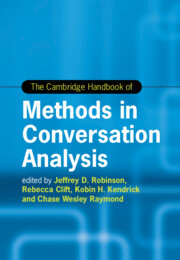The Cambridge Handbook of Methods in Conversation Analysis Cambridge Handbooks in Language and Linguistics Series
Langue : Anglais
Coordonnateurs : Robinson Jeffrey D., Clift Rebecca, Kendrick Kobin H., Raymond Chase Wesley

Conversation Analysis (CA) is one of the predominant methods for the detailed study of human social interaction. Bringing together thirty-four chapters written by a team of world-renowned experts, this Handbook represents the first comprehensive overview of conversation-analytic methods. Topics include how to collect, manage, and transcribe data; how to explore data in search of possible phenomena; how to form and develop collections of phenomena; how to use different types of evidence to analyze data; how to code and quantify interaction; and how to apply, publish, and communicate findings to those who stand to benefit from them. Each method is introduced clearly and systematically, and examples of CA in different languages and cultures are included, to show how it can be applied in multiple settings. Comprehensive yet accessible, it is essential reading for researchers and advanced students in disciplines such as Linguistics, Sociology, Anthropology, Communication and Psychology.
Part I. Introduction: 1. Methods in conversation analysis Jeffrey Robinson, Rebecca Clif, Kobin Kendrick and Chase Raymond; Part II. Points of Departure: 2. Conversation-analytic methods of data collection Elliott Hoey and Joe Webb; 3. Collecting interaction data in the 'lab' versus the 'field': rationale, ramifications, and recommendations Jeff Robinson; 4. Working with data I: field recordings Saul Albert and Hofstetter; 5. Multimodal transcription as process and analysis: capturing the audible and visible Alexa Hepburn and Florence Oloff; 6. Discovering a candidate phenomenon Rebecca Clift and Jenny Mandelbaum; 7. Data Sessions Emma Betz; Part III. Collections: 8. Working with collections in conversation analysis Steve Clayman; 9. Working with data II: clips and collections Saul Albert and Hofstetter; 10. History of a collection: repetition repairs Traci Walker; 11. Developing a collection: apologies Paul Drew; 12. Developing a collection: coordination of embodied conduct with darf/kann ich x? 'may/can I…?' in German Arnulf Deppermann and A. Gubina; Part IV. Evidence: 13. Evidencing conversation-analytic claims: how participants orient to social action Chase Raymond and Jeff Robinson; 14. Evidence for claims about interactants' sense-making processes Anita Pomerantz; 15. Conversation analysis as a comparative methodology Paul Drew, Ostermann, Charles Antaki and Chase Raymond; 16. The epistemics of epistemics: validating claims about epistemic stance in conversation analysis John Heritage; 17. Coding and statistically associating inter-action to advance conversation-analytic findings Jeffrey Robinson; Part V. Avenues into Action: 18. Single-case analysis Aug Nishizaka; 19. Ethnomethodology, conversation analysis, and the study of interaction in everyday life Doug Maynard and Virginia Gill; 20. Analyzing categorial phenomena in talk-in-interaction Kevin Whitehead, Geoff Raymond and Liz Stokoe; 21. Where the action is: positioning matters in interaction Danielle Pillet-Shore; 22. Analyzing particles Galina Bolden; 23. Analyzing grammar in social interaction Barbara Fox, Elizabeth Couper-Kuhlen, Chase Raymond, Marja-Leena Sorjonen and Sandra Thompson; 24. Listening to talk-in-interaction: ways of observing speech Richard Ogden; 25. Multimodality in conversation analysis Lorenza Mondada; 26. System-oriented analysis: moving from singular practices to organizations of practice Kobin Kendrick; 27. Comparing across languages and cultures Makoto Hayashi and Stephanie Hye Ri Kim; 28. Methodological considerations when using conversation analysis to investigate institutional interaction Merran Toerien; 29. Methods for 'applying' conversation analysis Rebecca Barnes; 30. Using conversation analytic research methods in the study of atypical populations Ray Wilkinson; Part VI. Situating and Reporting Findings: 31. CA across disciplines: connecting and engaging through publishing Rebecca Clift, Rod Gardner, Rose McCabe, Anssi Peräkylä and Jonathan Potter; 32. What do journal editors look for in publishing CA work? Charles Antaki, Leelo Keevallik and de Stefani; 33. Communicating findings to non-CA professionals Chloe Shaw; Part VII. Looking Forward: 34. Opening up avenues into action: future directions in conversation analysis Jeffrey Robinson, Rebecca Clift, Kobin Kendrick and Chase Raymond; Appendices: Appendix 1. Jeffersonian transcription conventions Jeffrey Robinson, Rebecca Clift, Kobin Kendrick and Chase Raymond; Appendix 2. Multimodal transcription conventions Lorenza Mondada.
Jeffrey D. Robinson is Professor in the Department of Communication at Portland State University.
Rebecca Clift is Senior Lecturer in the Department of Language and Linguistics at the University of Essex.
Kobin H. Kendrick is Senior Lecturer in the Department of Language and Linguistic Science at the University of York.
Chase Wesley Raymond is Associate Professor in the Department of Linguistics at the University of Colorado, Boulder, and Associate Clinical Professor in the Department of Family Medicine at the University of Colorado, Anschutz School of Medicine.
Rebecca Clift is Senior Lecturer in the Department of Language and Linguistics at the University of Essex.
Kobin H. Kendrick is Senior Lecturer in the Department of Language and Linguistic Science at the University of York.
Chase Wesley Raymond is Associate Professor in the Department of Linguistics at the University of Colorado, Boulder, and Associate Clinical Professor in the Department of Family Medicine at the University of Colorado, Anschutz School of Medicine.
Date de parution : 09-2024
Ouvrage de 800 p.
Thème de The Cambridge Handbook of Methods in Conversation Analysis :
© 2024 LAVOISIER S.A.S.



